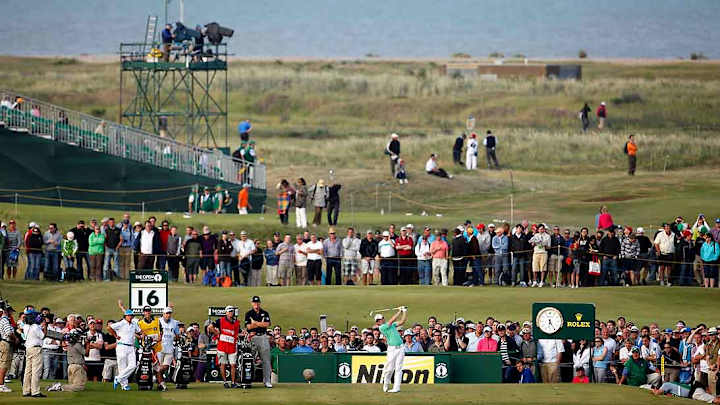The British Open is Great, But Don't Let This Year's Marketing Campaign Fool You

SANDWICH, England — “The One True Test.”
That’s one of the numerous marketing slogans the R&A is using to promote the British Open to the world.
Seeing this slogan, along with other duplicitous marketing ploys hanging on posts along the drive to the course, it struck me that the R&A had lost the bloody plot, to borrow another British expression.
Is it really possible that the R&A believes that this event, at this golf course, Royal St. George’s Golf Club, with this field, is actually the truest test?
Not really sure how that could be the case, but it’s worth an examination all the same.
Let’s start with the golf course. Royal St. George’s is hosting its 15th British Open and its early winners early were J.H. Taylor, Harry Vardon, Walter Hagen, Henry Cotton and Bobby Locke. All are well-known in golf’s history and deserving major champions. No issue here, but after Locke, the winners get somewhat suspect — with a few exceptions.
Bill Rogers (1981), Ben Curtis (2003) and Darren Clarke (2011) all won their lone major at Royal St. George’s. Of course, Sandy Lyle and Greg Norman have won more than one major title, but the point is that since Norman’s win in 1993, the winners on this track have been one and done.
Many believe this course is too quirky, that too much luck and the odd, fortuitous carom is required to hoist the Claret Jug.
“I don't know, it's not my favorite venue that we've played,” four-time major winner Brooks Koepka said of Royal St. George’s on Tuesday. “I think Portrush, and St. Andrews are definitely the favorites. I haven't seen all 18. I'll see the back nine today. But a couple — quite a few blind tee shots, kind of hitting to nothing. Fairways are quite undulating. I don't know, it's not my favorite of the rotation, put it that way.”
Koepka is not in the minority. Many believe that Royal St. George’s is the worst in the Open championship rota just because of the tremendous amount of luck involved.
Don’t think bad or good fortune comes into play a lot around this Sandwich course? Consider the fact that 18-time major winner Jack Nicklaus shot 83 in the opening round of the 1981 Open here, his worst-ever round in a British Open. When one of the best players to ever pick up a club is 13-over par in a round, it just makes you wonder.
Of course, coming here is fine for the occasional stop every 10 years or so, but it does little to defend the argument that this is The One True Test, especially when you can document example after example why this is a suspect course.
It could be unfair to take this particular The One True Test marketing claim at face value, because, after all, the R&A is in the business of promoting its brand and by extension its championship.
At the same time, if consumers have to be told something is the best — or in this case “The One True Test” — then the marketing has already failed. It should be a conclusion that the consumer should reach without being told so.
Each of the four majors has its unique DNA and over time they may swing a little right or a little left, but usually the pendulum comes back to the middle. It’s easy to shuffle them around between one and four, but that usually happens after the four are played in a reflective tone.
The Masters is somewhat of an exception because it’s always held at a pristine venue, Augusta National, but features the weakest of the four major fields. The Masters usually tops players’ lists of favorite majors. But you never see Augusta National officials jumping up and down, making wild claims that it’s the best of anything. Augusta National just tries to put on the best event possible and lets the public and media determine if it has succeeded.
Depending on the year, the U.S. Open, Open Championship or PGA Championship tends to have the best venue that is not Augusta National. This year, though, has not been the case with the Ocean Course at Kiawah Island, Torrey Pines and now Royal St. George’s. Anomalies exist, though.
When considering the strength of field, the PGA Championship generally has the strongest, mainly because its field does not have an open-qualifying process like the U.S. and British Opens. The Opens are technically hampered by their own selection method.

This year, due to the pandemic, the British Open had to alter its process to fill the field. There have been more than a dozen withdrawals leading up to this week’s event. Meanwhile, the PGA Championship had 99 of the top 100 players in the world rankings. By any measure the PGA’s field was stronger than this week’s field.
So, in the end, it’s clear that the lunacy of such a boastful phrase as “The One True Test’ is actually poppycock.
Of course, since this is my favorite major championship, I will watch with a keen eye to see links golf played for the first time in two years. Maybe not at its finest venue, but you have to take the good with the bad. Knowing that next year the Open will return to the Old Course at St. Andrews, I look forward to 2022.
More Morning Read Coverage of 2021 British Open:
- The Five Best Opens of the 21st Century
- Unfazed Bryson DeChambeau Turns Page on Caddie Saga
- Bettors' Roundtable: Favorites, Sleepers, Best Bets from Pool of Experts
- No Course Embraces Quirks Quite Like Royal St. George's'
- Shane Lowry Can Make Rare History This Week
- The Perfect Venue to Cap 2021 Major Season? It's Royal St. George's
- Americans Need to Man Up an Deal With British Open Travel Protocols
- Elements of Style: What Pros Will Wear This Week at British Open
- Gary Player Says St. George's is Easiest of Open Venues
